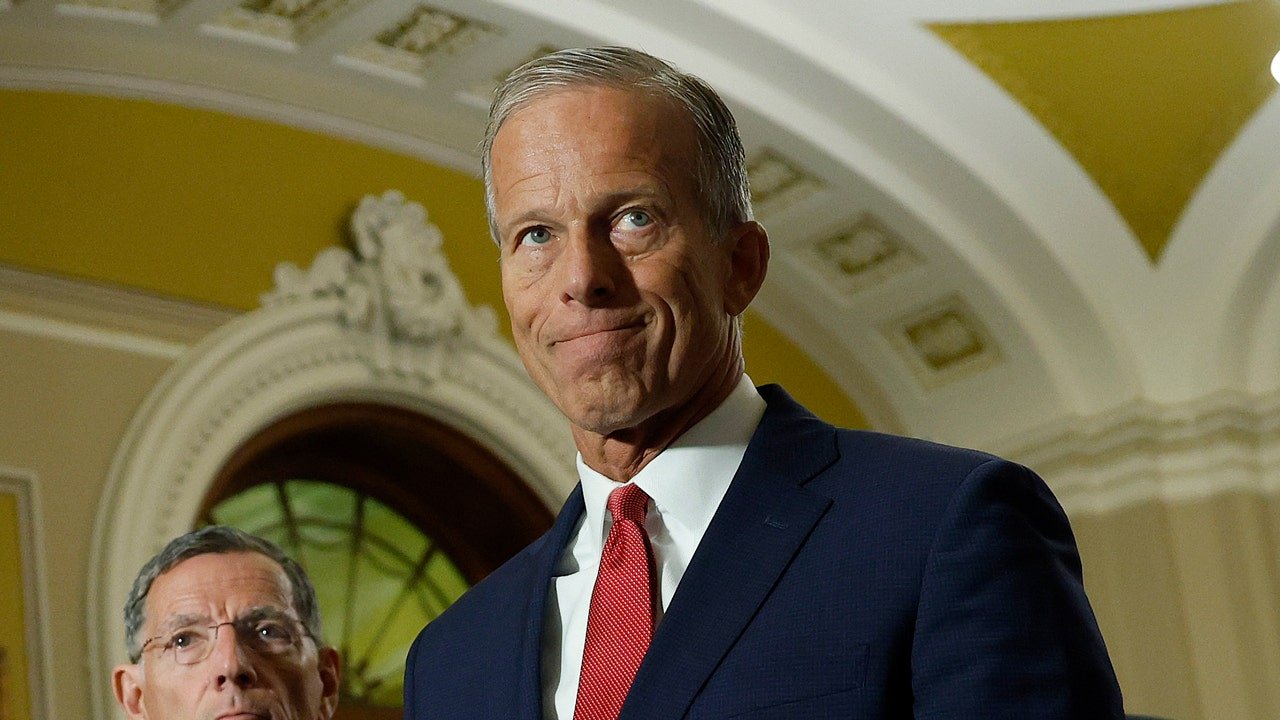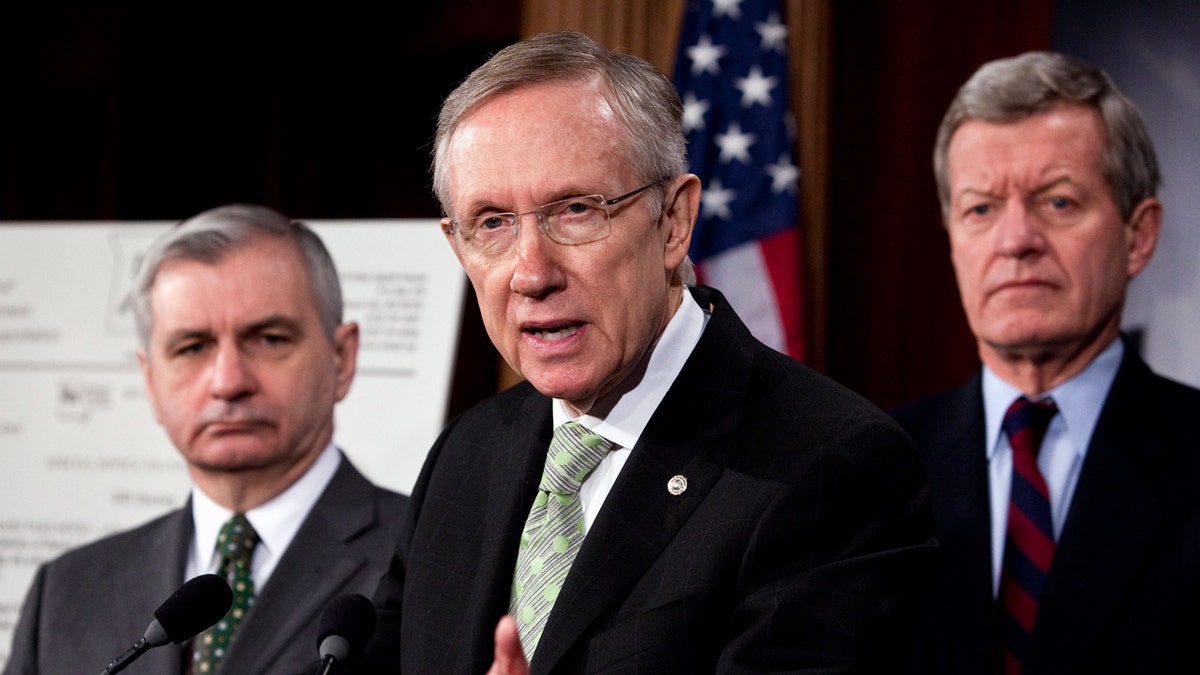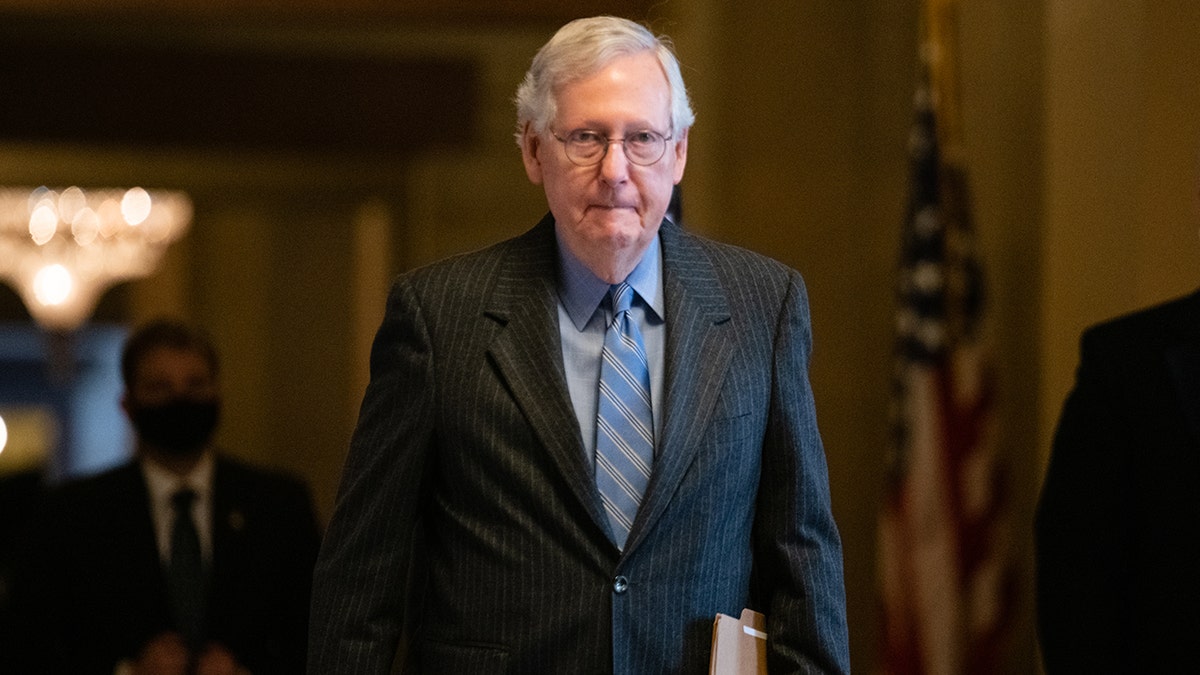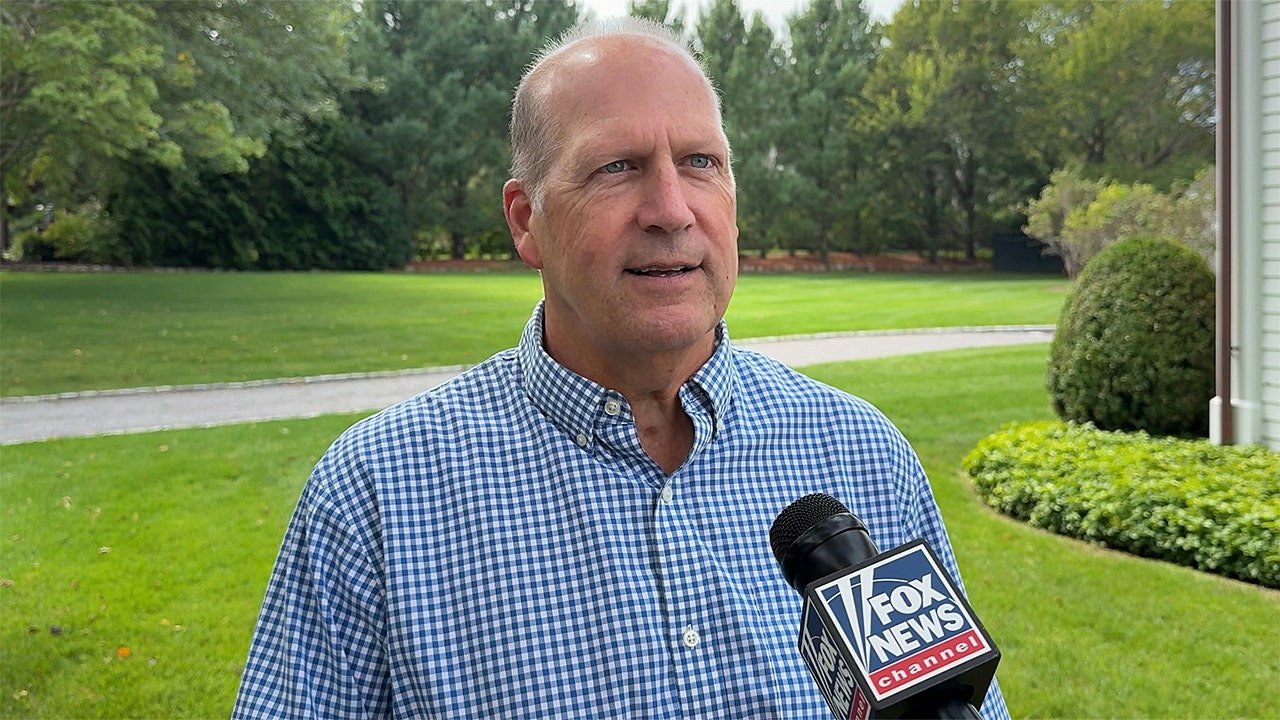INTERNACIONAL
Thune’s suitcase nuke – and the filibuster’s latest blast injury

NEWYou can now listen to Fox News articles!
It was a full-on nuclear explosion.
Just like the Pacific Testing Grounds near the Marshall Islands and French Polynesia.
But this political blast tore through the Senate chamber.
In November 2013, late Senate Majority Leader Harry Reid, D-Nev., detonated the first Senate «nuclear option.» He curbed the filibuster to confirm executive branch nominees – except the Supreme Court. Rather than 60 votes to break a filibuster, such nominees would only need a simple majority.
SENATE GOP LEADER MOVES TO LOWER FILIBUSTER THRESHOLD FOR TRUMP NOMINEES THROUGH NUCLEAR OPTION
Former Senate Majority Leader Mitch McConnell, R-Ky., ignited the second «nuclear option» in 2017. The Kentucky Republican anticipated a Democratic filibuster as the Senate tried to confirm Supreme Court Justice Neil Gorsuch. So McConnell chipped away at the filibuster bar for nominations to the High Court.
McConnell also lowered that bar from 60 yeas to 51.
Both of these instances were so dramatic, they featured parliamentary mushroom clouds erupting over the Capitol. The Senate eventually fell into nuclear winter after both instances, paralyzed from the fallout.
Senate Majority Leader John Thune, R-S.D., appears before the press following a policy luncheon at the Capitol Building on September 9, 2025 in Washington, D.C. (Kevin Dietsch/Getty Images)
Now, Senate Majority Leader John Thune, R-S.D., is poised to discharge the parliamentary equivalent of a «suitcase nuke» on Thursday.
Thune’s gambit isn’t something to ignore. It won’t carry the same immediate parliamentary weight of the maneuvers executed by Reid and McConnell. However, it’s another crack in the Senate custom of the filibuster. The legislative filibuster still exists. Senators can still block bills if they can prevent the body from cobbling together 60 yeas to break a filibuster.
Thune will follow the playbook established by Reid and McConnell to alter the Senate precedent (note, this is not a rules change. The Senate requires 67 votes to break a filibuster on a rules change) to expedite the confirmation of lower-level nominees in groups. This plan will not include judges nor cabinet secretaries.
Thune set his gambit into motion Monday by introducing a resolution to accelerate a slate of about 40 nominees. By rule, the Senate will take a procedural vote to break a filibuster on his resolution to confirm the batch of nominees on Thursday. The resolution itself – which is specific to this type of batch of nominees – needs 60 yeas. The Senate won’t get 60 yeas.
THUNE LAYS GROUNDWORK FOR NUCLEAR OPTION IN SENATE FIGHT OVER TRUMP NOMINEES
But this is exactly the scenario that Thune needs in order to go nuclear.
The coin of the realm in the Senate is unlimited debate. But one of the rare occasions senators can’t debate something is when an issue fails and a senator requests a re-vote. So a failed vote to break the filibuster backs the Senate into the exact parliamentary cul-de-sac which Thune wants.
At the end of the roll call vote, Thune will likely switch his vote from yes to no on breaking the filibuster. The Senate allows members to demand a mulligan if they are on the prevailing side of the issue. In this case, Thune is suddenly with the «noes,» even though he initially voted yes to break the filibuster. But remember, Thune is only temporarily switching his vote in order to advance his cause. He may lose the battle. But may ultimately win the war.
By changing his position, Thune can then order a re-vote on the roll call which failed. And since the Senate is in this unique posture of not allowing any debate, Democrats are paralyzed. They can’t do anything to stop Thune from what he plans next.

The late then-Senate Majority Leader Harry Reid, D-Nev., appears at a press conference on February 24, 2010, in Washington, D.C. (Brendan Smialowski/Getty Images)
This is very similar to what Reid did in 2013, followed up by McConnell in 2017, on the first two nuclear options.
Thune will then make a point of order on the floor.
Thune will assert that on the resolutions like the one he drafted, a bloc of lower-level nominees (e.g. – the ones now before the Senate) does not need 60 votes to break a filibuster. The chair – potentially Senate President Pro Tempore Chuck Grassley, R-Iowa, or even Vice President Vance, who is the President of the Senate – will presumably rule that Thune is wrong. Senate rules and precedent do require 60 votes to break a filibuster on this type of resolution.
CONGRESS RETURNS WITH DEMOCRATS REFUSING TO NEGOTIATE AS OCT 1 SHUTDOWN DEADLINE LOOMS
But Thune doesn’t stop there.
The Majority Leader will then request a vote to overturn how the chair ruled. He will assert that a simple majority is necessary to break a filibuster for this type of resolution – even though that’s never been the case before.
The Senate will vote. And if 51 senators vote in favor of ruling against the chair, the Senate will have established a new precedent. It will lower the threshold from 60 to 51 on this type of resolution to speedily advance a batch of nominees all at once.
Once the Senate does that, Thune will need to set up another procedural vote under the new precedents to break a filibuster. If Thune «files cloture» again on Thursday, the Senate can vote on Monday to break a filibuster – needing only 51 yeas – on Monday, Sept. 15. If the Senate votes to break the filibuster on the resolution under the revamped precedents, the Senate could vote to confirm the 48 nominees in question on Wednesday, Sept. 17.

Then-Senate Minority Leader Mitch McConnell, R-Ky., walks to the Senate floor on Jan. 18, 2022, in Washington, D.C. (Eric Lee/Bloomberg via Getty Images)
Here’s an example of some of the nominees in the queue for confirmation:
Former Rep. Brandon Williams, R-N.Y., is up for Under Secretary for Nuclear Security. President Trump tapped Leslie Beyer to serve as Assistant Secretary of the Interior. Richard Anderson to become an Assistant Secretary of the Air Force. Jovan Jovanovic to lead the Export-Import Bank. Callista Gingrich, wife of former House Speaker Newt Gingrich, R-Ga., is the President’s pick as Ambassador to Switzerland and Liechtenstein.
Thune says that Democrats are obstinate, not allowing the Senate to confirm a batch of nominees in one fell swoop. He accuses Democrats of obstruction, saying the minority is trying to undermine the President.
«This is simply the world’s longest, most drawn out temper tantrum over losing an election,» said Thune.
TRUMP NOMINEES PILE UP AS GOP WEIGHS RULE SHIFT ONCE FLOATED BY DEMOCRATS
But Senate Minority Leader Chuck Schumer, D-N.Y., had a message for Republicans: caveat emptor. Especially when Democrats eventually return to the majority and have a Democratic president.
«I say to my Republican colleagues, think carefully before taking this step,» warned Schumer. «If you go nuclear, it’s going to be a decision you will come to regret.»
One could argue that Democrats helped crack open this door when Reid initiated Nuclear Option #1 in 2013. Democrats were frustrated over Republicans hamstringing President Obama’s nominees.
The same when McConnell returned the favor over the Supreme Court with Nuclear Option #2 in 2017.
And if you’re a real student of history, consider that late Senate Majority Leader Robert Byrd, D-W.V., really set the table for Thune’s maneuvers via three precedent gambits in 1980.

The late then-Sen. Robert Byrd, D-W.Va., is seen in his Capitol office on January 20, 1979, in Washington, D.C. (UPI/Bettmann Archive/Getty Images)
So the tit-for-tat continues.
During the Cold War standoff between the U.S. and the Soviet Union, geopolitical observers said the world teetered on mutually assured destruction. Launching a nuclear attack on one nation would result in annihilation of both countries. One country may strike first. But the prime aggressor would not survive because of guaranteed retaliation, in kind.
There is no such mutually assured destruction doctrine in this parliamentary wargame. Neither Democrats nor Republicans have fired a full nuclear volley at the other side. Each strike has been «strategic,» directed at a limited political target. Thus, there’s no mutually assured destruction.
CLICK HERE TO GET THE FOX NEWS APP
But that also means there’s no incentive for Senate détente.
And that’s why these parliamentary strikes and counterstrikes probably don’t end any time soon.
congress,senate,republicans
INTERNACIONAL
Former GOP senator emerges from private sector with new mission: ‘Somebody has to step up’

NEWYou can now listen to Fox News articles!
EXCLUSIVE: Former Republican Sen. John E. Sununu of New Hampshire wants his old job back.
And on Wednesday, Sununu took a big first step towards returning to Capitol Hill as he announced his candidacy in the 2026 race to succeed retiring Democratic Sen. Jeanne Shaheen in New England’s only swing state.
Sununu, in a campaign launch video shared first nationally with Fox News Digital, said that nowadays «Congress just seems loud, dysfunctional, even angry,» and that he wants to «return to the Senate to help calm the waters.»
Sununu is a former three-term representative who defeated then-Gov. Shaheen in New Hampshire’s 2002 Senate election. But the senator lost to Shaheen in their 2008 rematch.
HEAD HERE FOR THE LATEST FOX NEWS REPORTING ON THE 2025 ELECTIONS
Former Republican Sen. John E. Sununu of New Hampshire is interviewed by Fox News Digital, on Sept.15, 2025 in Rye, N.H. (Paul Steinhauser/Fox News Digital)
Shaheen announced earlier this year that she wouldn’t seek re-election in next year’s midterms and Republicans are working to flip the seat as they aim to not only defend but expand their Senate majority.
Now, after nearly two decades in the private sector, Sununu is ready to return to the Senate campaign trail in New England’s only swing state.
«Maybe you’re surprised that I’m running for the Senate again,» Sununu says to the camera in his video. «I’m a bit surprised myself. Why would anyone subject themselves to everything going on there right now. Well, somebody has to step up and lower the temperature. Somebody has to get things done.»
THUNE SPEAKS WITH SUNUNU ABOUT SENATE BID TO FLIP BLUE SEAT RED
Sununu is a brand name in New Hampshire politics. The former senator’s father, John H. Sununu, is a former governor who later served as chief of staff in then-President George H.W. Bush’s White House. And one of his younger brothers is former Gov. Chris Sununu, who won election and re-election to four two-year terms steering the Granite State.
But Sununu won’t have a glide path to the GOP nomination.
Former ambassador and former Sen. Scott Brown, who was elected and served three years in the Senate in neighboring Massachusetts, and who, as the 2014 GOP Senate nominee in New Hampshire, narrowly lost to Shaheen during her first re-election, jumped into the race in late June.

Former Sen. Scott Brown, who launched a Republican Senate campaign in New Hampshire in June, is interviewed by Fox News Digital, on July 4, 2025, in Exeter, N.H. (Paul Steinhauser/Fox News )
«Our campaign will have the necessary resources for the long haul, and allow me to campaign the only way I know how: relentless hard work and a focus on retail politics that Granite State voters expect,» Brown said after Fox News first reported that he hauled in roughly $1.2 million in fundraising the past three months.
Brown has repeatedly taken aim at Sununu the past month over the former senator’s lack of past support for President Donald Trump, who holds immense clout over the GOP.
TOP POLITICAL HANDICAPPER REVEALS DEMOCRATS CHANCES OF WINNING BACK THE SENATE MAJORITY
Sununu served as national co-chair on the 2016 Republican presidential campaign of then-Ohio Gov. John Kasich, who declined to support Trump as the party’s nominee.
And Sununu, along with then-Gov. Chris Sununu, endorsed former ambassador and former South Carolina Gov. Nikki Haley in the 2024 New Hampshire Republican presidential primary, as she battled Trump for the nomination.
And on the eve of the first-in-the-nation presidential primary, the former senator wrote an opinion piece titled «Donald Trump is a loser,» that ran in the New Hampshire Union Leader, the state’s largest daily newspaper.
Brown endorsed Trump ahead of his 2016 New Hampshire primary victory, which launched him toward the GOP presidential nomination and ultimately the White House. Brown later served as U.S. ambassador to New Zealand during Trump’s first term.

Sen. Jeanne Shaheen, D-N.H., seen speaking at a policy event in Concord, New Hampshire on Oct. 22, 2024, is not seeking re-election next year. (Steven Senne/AP Photo)
«Anyone who thinks that a never Trump, corporate lobbyist who hasn’t won an election in a quarter century will resonate with today’s GOP primary voters is living in a different universe. While John was supporting John Kasich in 2016, I was campaigning with Donald Trump,» Brown charged in a statement to Fox News.
And pointing to Sununu’s past decade and a half in the private sector, Brown argued that «while John was fighting for special interests, I was serving in the first Trump administration. While John was wooing the DC establishment this summer, I have been working with grassroots activists across the Granite State. Senate seats are earned, not handed down.»
TRUMP NOT ON BALLOT BUT FRONT-AND-CENTER IN 2025 ELECTIONS
Trump, whose endorsement in Republican primaries is extremely influential, has remained neutral to date.
But the president may be willing to overlook Sununu’s past jabs.
Earlier this year, when Chris Sununu flirted with a Senate bid after leaving office, Trump urged him to run.
The younger Sununu, who was Haley’s top supporter and surrogate in New Hampshire, repeatedly criticized Trump during the 2024 Republican presidential primaries.

Former Ambassador and former South Carolina Gov. Nikki Haley, center, is joined by then-New Hampshire Gov. Chris Sununu, right, as they visit a polling location to greet voters casting ballots in the state’s first-in-the-nation presidential primary, on Jan. 23, 2024, in Hampton, New Hampshire. (Joe Raedle/Getty Images)
Trump told reporters in April that he had met with the former governor in the Oval Office and that he’d «support him fully.»
«He’s been very nice to me over the last year or so,» Trump added. «I hope he runs. I think he’ll win that seat.»
FIRST ON FOX: SCOTT BROWN SHOWCASES HEALTHY WARCHEST
And a national Republican strategist familiar with the Senate race in New Hampshire told Fox News Digital last month, «President Trump appreciates winners and understands that John E. Sununu puts this race on the map for Republicans.»
As Fox News reported, Sununu met last month with Senate Majority Leader John Thune and former Sen. Cory Gardner, who served as chair of the Senate Leadership Fund, which is the top super PAC supporting Senate Republicans. National Republicans view Sununu as the strongest candidate to win back the seat in New Hampshire.

New Hampshire Democratic Senate candidate Rep. Chris Pappas is interviewed by Fox News Digital on July 4, 2025, in Portsmouth, N.H. (Paul Steinhauser/Fox News Digital)
Four-term Democratic Rep. Chris Pappas, who launched his Senate campaign in early April, is the clear frontrunner for his party’s nomination.
CLICK HERE TO GET THE FOX NEWS APP
While New Hampshire has for over a century held the first-in-the-nation presidential primary, its state primary, which will be held next September, is one of the last-in-the-nation.
While Republicans have had success in state elections — they control the governor’s office and both chambers of the state legislature — the GOP hasn’t won a Senate election in New Hampshire since 2010.
elections,midterm elections,republicans elections,senate elections,new hampshire,donald trump,campaigning,politics
INTERNACIONAL
Cómo el estrés acelera el envejecimiento biológico: claves y consejos para revertirlo, según la ciencia

El estrés puede acelerar el proceso de envejecimiento biológico en personas de todas las edades. Esto ocurre cuando el organismo enfrenta situaciones que exceden sus recursos, lo que produce una sobrecarga que afecta tanto la salud física como la mental.
Distintos estudios científicos señalan que las marcas del estrés intenso en el cuerpo son visibles, pero reversibles si la causa desaparece. La relación entre el estrés y el envejecimiento despierta un interés especial en la actualidad, donde la expectativa de vida supera los 60 años en gran parte del mundo.
En ese sentido, expertos consultados por Psicología y Mente aseguraron que es esencial comprender la diferencia entre la edad cronológica y la edad biológica. La primera define el tiempo transcurrido desde el nacimiento de una persona.

En cambio, la edad biológica se refiere al estado real del organismo en comparación con ese tiempo. Este concepto incorpora la genética y los hábitos de vida. Un factor relevante es el estrés, que podría provocar que la edad biológica aumente y se distancie de la cronológica, acelerando así el envejecimiento.
De acuerdo con la información presentada por los especialistas, el estrés es una reacción natural frente a demandas que superan la capacidad de respuesta del individuo. El cuerpo y la mente activan este proceso para afrontar situaciones adversas.
Esta activación permite superar obstáculos, mejora la eficiencia y favorece la adaptación en ciertas circunstancias. Sin embargo, si la recuperación no se produce y el estrés persiste, el organismo sufre un desgaste significativo que afecta las funciones físicas y mentales.

Los síntomas del estrés afectan varios ámbitos de la salud. Entre los más habituales se encuentran dolores de cabeza, trastornos digestivos, rigidez en la mandíbula, fatiga y cansancio. Además, investigaciones recientes demuestran que el impacto no se limita a molestias puntuales, sino que también propicia un envejecimiento acelerado a nivel biológico.
Ciertos momentos de la vida, como una cirugía, una internación en la unidad de cuidados intensivos por una enfermedad como el COVID-19, o el embarazo, pueden generar un aumento medible en la edad biológica. Un trabajo publicado en la revista Cell Metabolism documentó que el incremento en la edad biológica, producido en estos escenarios, puede revertirse días o meses después cuando desaparece la causa del estrés.
En tanto, un estudio previo, también publicado en Cell Metabolism, demostró que incluso una sola noche de privación de sueño genera aumentos medibles en la edad biológica a través de marcadores epigenéticos e inmunológicos. Sin embargo, los investigadores comprobaron que estos efectos pueden revertirse completamente cuando se restablecen patrones normales de descanso.

En ese tono, la investigación dirigida por Jesse R. Poganik y su equipo, perteneciente al Departamento de Medicina del Brigham and Women’s Hospital, Facultad de Medicina de Harvard, examinó muestras de sangre en pacientes mayores que se sometieron a una intervención quirúrgica.
Según los datos obtenidos, la edad biológica mostró una notable elevación inmediatamente antes del procedimiento. Sin embargo, los valores regresaron a lo habitual entre cuatro y siete días después de la operación. El estudio también incluyó a personas hospitalizadas por COVID-19 y a mujeres gestantes. En ambos grupos, una vez finalizada la situación estresante, la edad biológica volvió a registros similares a los anteriores.
El patrón se observa con claridad: mientras el factor estresante está presente, la edad biológica aumenta. Cuando se elimina ese factor, el cuerpo puede recuperar su estado anterior. Este hallazgo genera optimismo, ya que indica que los efectos negativos del estrés sobre el envejecimiento no resultan definitivos en la mayoría de los casos.

De acuerdo con información recopilada en Psicología y Mente, la resiliencia psicológica cumple un rol fundamental en la protección frente a los daños del estrés. Las personas con mayor capacidad de adaptación a las dificultades experimentan menos aceleración en el envejecimiento biológico. Investigadores observaron que quienes regulan mejor sus emociones y mantienen autocontrol logran mayor resistencia a los efectos del estrés en el organismo.
La adopción de hábitos saludables también contribuye a reducir el impacto negativo del estrés sobre el proceso de envejecimiento. Según los especialistas citados por Psicología y Mente, una alimentación equilibrada, la actividad física regular, la abstinencia de tabaco y alcohol, y el cuidado emocional favorecen la prevención de enfermedades y fortalecen la capacidad de recuperación. Estas pautas ayudan a mantener durante más tiempo la autonomía y la calidad de vida.
La ciencia considera el envejecimiento como una acumulación de daños celulares y moleculares, un proceso que se acelera cuando el cuerpo se ve sometido de manera sostenida a situaciones que generan estrés. Este desgaste puede reducir la funcionalidad física y mental, aumentar el riesgo de enfermedades e, incluso, adelantar la aparición de dependencia.

Los resultados de las investigaciones recientes revelan la importancia de prestar atención a los signos de estrés y de buscar recuperarse en forma activa. Cuando las personas logran calmar los factores que les provocan sobrecarga, los indicadores biológicos mejoran y la “edad” del organismo desciende hasta alcanzar registros normales.
El conocimiento sobre la relación entre estrés y envejecimiento permite a individuos y comunidades actuar de manera informada. La salud integral requiere atención tanto en el plano físico como en el mental. La detección y la gestión efectiva del estrés, sumadas a la resiliencia y a estilos de vida saludables, constituyen las mejores estrategias para cuidar el cuerpo y mantener el bienestar a lo largo de los años.
El control del estrés, la adopción de hábitos sanos y el fortalecimiento emocional se imponen así como claves en la búsqueda de una vida larga y plena. La evidencia muestra que evitar el impacto negativo del estrés está al alcance de la mayoría si se asumen conductas de cuidado y prevención.
adult,anxiety,burnout,business,business operations,business pressure,business tasks,businesswoman,camera,challenges,company,computer,corporate,deadline,deadlines,disappointment,emotional strain,employee,enterprise,entrepreneur,executive,exhaustion,fatigue,financial,frustration,goals,growth,headache,laptop,low energy,manager,managing,mental,mental exhaustion,migraine,multinational company,objectives,office,office burnout,overload,overwhelmed,pressure,professional,professional struggle,project,projects,stress,successful,technology,tough day,woman,worker
INTERNACIONAL
Speaker Johnson hit with Democrat-led lawsuit over delayed swearing-in amid House shutdown chaos

NEWYou can now listen to Fox News articles!
The state of Arizona is suing Speaker Mike Johnson, R-La., over the delayed swearing-in of Rep.-elect Adelita Grijalva, D-Ariz.
«Speaker Mike Johnson is actively stripping the people of Arizona of one of their seats in Congress and disenfranchising the voters of Arizona’s seventh Congressional district in the process,» Arizona Attorney General Kris Mayes, a Democrat, said in a statement.
«By blocking Adelita Grijalva from taking her rightful oath of office, he is subjecting Arizona’s seventh Congressional district to taxation without representation. I will not allow Arizonans to be silenced or treated as second-class citizens in their own democracy.»
Johnson dismissed the lawsuit as a bid to get «national publicity» in comments to reporters earlier this week and on Tuesday evening.
BATTLEGROUND REPUBLICANS HOLD THE LINE AS JOHNSON PRESSURES DEMS ON SHUTDOWN
Speaker of the House Mike Johnson speaks during a news conference at the U.S. Capitol on the tenth day of the federal government shutdown on Oct. 10, 2025, in Washington, D.C. (Alex Wroblewski/AFP via Getty Images)
«I think it’s patently absurd. We run the House. She has no jurisdiction. We’re following the precedent,» Johnson said in response to the state attorney general. «She’s looking for national publicity, apparently she’s gotten some of it, but good luck with that.»
Grijalva won a special election on Sept. 23 to replace her father, late Rep. Raul Grijalva, D-Ariz., after he passed away from cancer at age 77.
Johnson has repeatedly said that Grijalva will be sworn into office when the House returns to its regular sessions. But it’s not clear when exactly that will be — the House GOP leader has threatened to keep his lawmakers out of Washington, D.C., until the ongoing government shutdown is over.
It’s a bid to pressure Senate Democrats, led by Minority Leader Chuck Schumer, D-N.Y., to agree to the GOP’s plan to fund the federal government through Nov. 21.
But Schumer and his allies have resisted thus far, sinking the Republican-led bill 11 times and keeping the shutdown going for 21 days.
House Democrats have accused Johnson of playing politics and depriving Arizona’s 7th Congressional District of representation in the process.
«Republicans on vacation for four weeks — and one of the consequences of that is that Republicans have refused, now for four consecutive weeks, to swear in Representative-elect Adelita Grijalva, depriving hundreds of thousands of people in the state of Arizona of the representation that they deserve, particularly during this challenging moment in the country,» House Minority Leader Hakeem Jeffries, D-N.Y., said during a press conference on Tuesday.

Rep.-elect Adelita Grijalva is interviewed in Tucson, Arizona, on July 15, 2025 (Rebecca Noble/Getty Images)
Johnson, in response to Democrats’ criticism, has repeatedly pointed out that the House was not in session when Grijalva won her election.
He’s also argued that he was following precedent set by former Speaker Nancy Pelosi, D-Calif., who waited 25 days to swear in Rep. Julia Letlow, R-La., in 2021.
Letlow had won a special election to replace her husband, Rep.-elect Luke Letlow, R-La., who died during the COVID-19 pandemic before he could be sworn into office in January 2021.
«We are not in legislative session. The chronology is important. Rep. Grijalva won her race, I think it was the last week of September, after we had already gone out of session. So I will administer the oath to her, I hope, on the first day we come back,» Johnson said.
58 HOUSE DEMS VOTE AGAINST RESOLUTION HONORING ‘LIFE AND LEGACY’ OF CHARLIE KIRK
«I’m willing and anxious to do that. In the meantime, instead of doing TikTok videos, she should be serving her constituents.»
Grijalva has argued she cannot perform her legislative or constituent duties without being sworn in first, which Johnson and Republicans have disputed.
But her swearing-in is also key to the ongoing battle over Jeffrey Epstein documents going on in the House.
Once made a member of Congress, Grijalva is expected to be the deciding signature on a measure aimed at forcing a House-wide vote on releasing Epstein documents in the Department of Justice’s (DOJ) possession.

Arizona Attorney General Kris Mayes, then a Democratic candidate for her role, speaks at a Women’s March rally outside the State Capitol on Oct. 8, 2022 in Phoenix, Arizona. (Mario Tama/Getty Images)
CLICK HERE TO GET THE FOX NEWS APP
The measure, called a discharge petition, is designed to end-run House leaders on specific legislation — provided it has a majority of lawmakers’ signatures.
Johnson and House GOP leaders have called the measure superfluous and political, pointing to the chamber’s own ongoing investigation and procedures aimed at widening transparency into Epstein’s case.
However, the speaker has signaled he would not block the measure if it came to the House floor when Grijalva was sworn in.
Fox News Digital reached out to Johnson for a response but did not immediately hear back.
house of representatives politics,democrats,politics,mike johnson,arizona

 CHIMENTOS3 días ago
CHIMENTOS3 días agoLa cruda confesión del Turco Naim a 1 año de la separación de Emilia Attias: «Me di cuenta que hay que aprender a estar solo»

 POLITICA3 días ago
POLITICA3 días agoExigen que Cristina Kirchner y los candidatos de Fuerza Patria aclaren si fueron financiados por el narco venezolano

 CHIMENTOS2 días ago
CHIMENTOS2 días agoPampita recibió un video inesperado de su hija Blanca en el Día de la Madre y no pudo contener la emoción



























